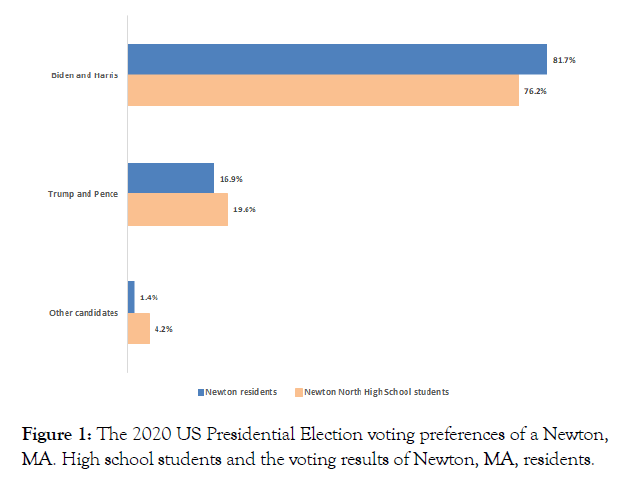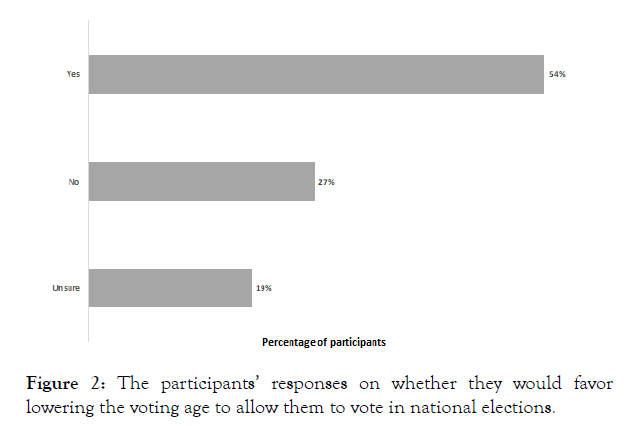Sociology and Criminology-Open Access
Open Access
ISSN: 2375-4435
ISSN: 2375-4435
Editorials - (2021)Volume 9, Issue 4
There is a growing debate on whether people younger than 18 are ready to vote in national elections. Hence, a survey study was conducted to evaluate the voting preferences of 392 students from a high school in Newton, MA, USA, in the run-up to the 2020 US Presidential Election, and compare them with the voting results in the general population of Newton. Furthermore, we sought the perspectives of the high school students on allowing people under 18 to vote. A total of 161 of 392 surveys were completed (41.1% response rate). The results of the hypothetical voting by high school students were similar to the publicly available voting results of the residents of the city of Newton, suggesting that young voters can be trusted to make informed decisions and adequately participate in the voting process.
Young voters; Political maturity; Elections; Voter turnout; Democracy
Most countries around the world, including the United States, do not allow people under 18 from voting in national elections. The main argument made against allowing 16- and 17-year-olds to vote is that they lack the neurological development, civic knowledge, political maturity, and the motivation to participate effectively in the electoral process which would then lead to lower turnout and lower quality voting [1,2]. However, there is ample evidence that young people under 18 have the developmental maturity and the knowledge necessary to reliably participate in the voting process [3-5].
Furthermore, in the United States there has been an increasing political support for lowering the voting age to 16. The 2020 Democratic Presidential candidate is the first presidential candidate to openly support decreasing the federal voting age to 16, arguing that doing so would increase turnout, promote civic engagement, and let young people have a say in their own future [6]. Rep. Ayanna Pressley (D-Mass.) introduced a bill in March of 2019 proposing a voting age of 16, citing youth political activism on a range of civic issues. [7] Although the legislation did not get the majority to advance, it illustrates an intensifying debate on lowering the voting age to 16.
The goal of this study was to evaluate the voting preferences of high school students in the run-up to the 2020 US Presidential Election, and compare them with the voting results in the general population. Furthermore, we sought the perspectives of the high school students on allowing people under 18 to vote.
An anonymous survey regarding their voting preferences in the 2020 US Presidential Election was distributed using an internet-based survey tool (Survey Monkey®) to 392 students from a high school in Newton, MA, USA, between 09/25/20 and 11/02/20.
The survey was comprised of 5 questions, with associated responses consisting of “best choice” answers (Supplement). Each participant was able to respond only once to the survey. Completion of the survey was voluntary, and anonymity was ensured by not requiring any personal identifiers. Participants were informed in writing that by answering the questions and returning the survey, they were providing and documenting their willingness to participate. Results were calculated based on the number of responses received to each individual question (Survey Questionaries).
A total of 161 of 392 surveys were completed (41.1% response rate). The demographic characteristics of our survey participants are displayed in (Table 1).
Characteristics |
N (%) | |
|---|---|---|
| Current grade | 9-th grade | 50 (31.1%) |
| 10-th grade | 19 (11.8%) | |
| 11-th grade | 54 (33.5%) | |
| 12-th grade | 38 (23.6%) | |
| Gender | Female | 67 (41.6%) |
| Male | 91 (56.5%) | |
| Non-binary | 1 (0.6%) | |
| Not specified | 2 (1.2%) | |
| Ethnicity | White | 113 (70.2%) |
| Asian or Pacific Islander | 23 (14.3%) | |
| African American | 10 (6.2%) | |
| Hispanic | 10 (6.2%) | |
| Middle Eastern | 2 (1.2%) | |
| Multiracial | 2 (1.2%) | |
| Not specified | 1 (0.6%) | |
Table 1: Demographic Characteristics of Survey Respondents.
When asked what would be their choice for President and Vice President if they were voting in the 2020 US Presidential Election, only 143 participants made a hypothetical selection. The results of their hypothetical voting were similar to the publicly available voting results of the residents of the city of Newton, MA, [8] (Figure 1). Our participant responses were comparable when stratified by gender, ethnicity, and grade level.

Figure 1: The 2020 US Presidential Election voting preferences of a Newton, MA. High school students and the voting results of Newton, MA, residents.
More than half (54%) of participating students believe that people younger than 18 should have the right to vote in the US presidential election, compared to 27% of students that disagreed (Figure 2).

Figure 2: The participants’ responses on whether they would favor lowering the voting age to allow them to vote in national elections.
When stratified by grade level, the percentage of 11th + 12th grade students that were in favor of lowering the current the voting age requirement was more than three times higher than that of 9th + 10th grade students (65% vs. 21% respectively). The responses were comparable when stratified by gender and ethnicity.
The results of our study show that the voting preferences of high school students are similar to the voting results of the general population. This is in line with evidence showing that in countries that have lowered the voting age to 16, the quality of the voting choices made by people younger than 18 is similar to that of older voters. [4] This similarity suggests that young voters can be trusted to make informed decisions and adequately participate in the voting process.
Lowering the voting age to 16 can have a positive impact on the democratic process. Studies suggest that lowering the voting age to 16 may improve voting turnout because people younger than 18 are in a structured educational environment and would be more easily mobilized due to socialization effects [9,10]. Furthermore, there is evidence that after the voting age was lowered to 16 in Austria in 2007, the interest in politics increased among 16- and 17-year-olds [11]. An interest in politics is considered an important motivational force can increase participation and voting turnout [12]. Allowing 16- and 17-year-olds could also have a “trickle up” effect by increasing the turnout of their parents and other adult family members [13-14].
Allowing 16- and 17-year-olds to vote would help them develop voting habits that could last for a lifetime. There is evidence showing voting history is important [15], and that people voting in elections when they first reach voting age are more likely to participate in future elections [3,10].
Our survey results show that 16- and 17-year-old students are three times more in favor of lowering the voting age requirement than the 14- and 15-year-olds (65% vs. 21% respectively). This finding suggests a higher level of political interest among the 16- and 17-year-olds, and would lend more support to calls for lowering the voting age to 16, but not going below that [3,16].
The present study has some limitations. First, the small sample size and the single institution nature of our study could limit the ability to generalize our findings. Surveying a larger group of high school students from multiple institutions would be an important next step in generalizing and validating the findings of our study. Second, with a response rate of 41.1%, we cannot exclude meaningful differences between students who answered our questionnaire and the non-respondents.
Even with these limitations, we believe our findings will have a meaningful contribution to the larger debate on further lowering the voting age to 16.
The results of this survey show that the voting abilities of high school students are not inferior to those of older voters. Therefore, young voters should be trusted to make informed decisions and adequately participate in the voting process.
This research did not receive any specific grant from funding agencies in the public, commercial, or not-for-profit sectors.
Citation: Kristo EA (2021) How Would High School Students have voted in the 2020 US Presidential Election? Making a Case for Lowering the Voting Age to 16. Social and Crimonol 9: 209.
Received: 16-Mar-2021 Accepted: 28-Mar-2021 Published: 16-Apr-2021 , DOI: 10.35248/2375-4435.21.9.209
Copyright: © 2021 Kristo EA. This is an open-access article distributed under the terms of the Creative Commons Attribution License, which permits unrestricted use, distribution, and reproduction in any medium, provided the original author and source are credited.